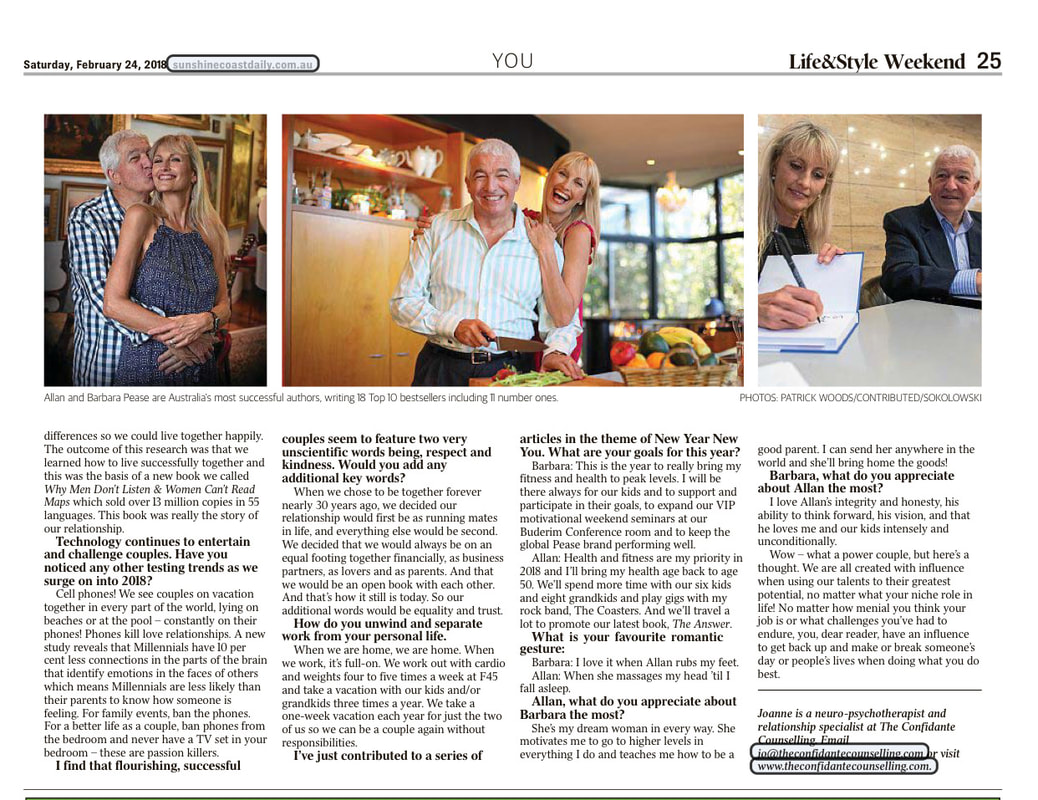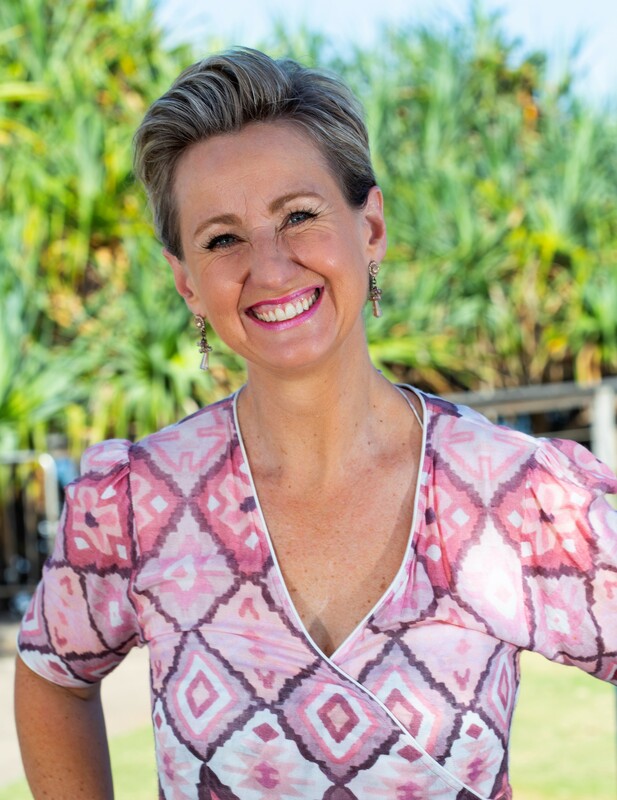
Have the recent bizarre years extinguished your energy for passion and romance? You wouldn’t be the only one to have found yourself suffering from a bad case of “flat-mate syndrome”. Maybe you’re even struggling to make conversation with the person you fell head-over-heels with many moons ago or getting down and flirty together is a distant memory.
Valentine’s Day is the perfect cue to invigorate your relationship with these strategies for the whole year to get that head-over-heels feeling back in your relationship. Don't just leave it at one day. 1. Complete yourself first Check that you are head-over-heels in love with yourself first. Are you relying on your partner to “complete you” with fancy displays of adoration? Whilst many of us can be a total sucker for flowers and any form of romance any day of the week, a healthy contribution to the relationship is founded on a healthy sense of self first. Both partners need to be resilient and open to constructive “feedback” from each other in a non-blaming way to learn and grow together. Only then can you enjoy a flourishing and dynamic relationship featuring someone wonderfully matched to the best version of you! 2. A grateful heart is a magnet for miracles Seeking a divine miracle to transform your relationship? It is so easy to fall prey to a mindset that focuses on criticism and even contempt. Experiment with the gift of gratitude either together or for your partner by writing a list of your 20 favourite things you have loved about the other, then read them out loud. Your praise can be about anything from their appearance and achievements to their personality, hobbies or quirks. Including "intrinsic" words of affirmation benefits couples far more than just "extrinsic" praise (appearance). Be honest and glow with admiration for each other. 3. Go soul-gazing Forget the cheesy stargazing and go “soul-gazing”. Face each other in a seated position. Keep your knees close to touching and hold eye contact for 5 minutes. Avoid talking, burping, gas emissions and welcome the awkwardness. Background music is optional. Once you've perfected this, experiment with other seated positions or lying down. Extended eye contact (with someone that you have positive feelings toward) is scientifically proven to increase feelings of connection and intimacy. 4. Get out of the comfort of your discomfort Neuroscience reveals that we stay captive to unhelpful routine behaviours purely because it is easier to keep doing them versus risk something new. Now is the time to throw comfort zones out the window! Plan something completely novel to reinvigorate your routine, not just this week but at least once every month. Here are some examples: acting classes, soap carving, interpretive dancing, geocaching, square-dancing, basket weaving, noodling (either the musical or fishing type), nude model painting or pottery to the Ghost movie soundtrack? Life is too short to stay in the comfort of the lacklustre discomfort. 5. Love Coupons This is where you commit to performing self-sacrificing acts for your beloved you might not necessarily enjoy. You write, “This coupon entitles the holder to ……(your partner’s choice), or one-foot rub, one evening in with….., a meal cooked for you, a night out with the lads/gals, King/Queen of the remote control, breakfast in bed, vacuum your car. These little things mean so much. They’re redeemable for any time until next Valentine’s Day, or you can add fine print with a shorter expiry date for those you’re hoping to get out of. 6. Be selfless to allow a selfish session Take turns granting each other an intimate selfish session! When it is your turn, dictate to your partner your desires. It is your time, moment to moment chosen by you to be pleasured by your partner. Respect each other's boundaries but make it your mission to relish in and please each other. 7. Pump someone else’s heart It is a sobering thought to imagine how many cannot celebrate Valentine’s Day as they’re fighting for their lives. No one has been untouched by a sudden accident or cancer in some shape or form. Why not donate some of your healthy platelets to those fighting the battle or a patient who may need it for surgery. Importantly, your brain will light up with happiness by spreading the love beyond your relationship, creating a ripple effect from the gift of your health and well-being! Joanne Wilson is the facilitator of the Relationship Rejuvenator online mini-courses and author of Renovate Your Relationship – All The DIY Tools For Your Most Important Project ($29.99). Find out more at www.relationshiprejuvenator.com Click on the images below... We’re up to the final part of my Intentional Relationship series where I’m offering great tips to “level up” your relationship. So far we’ve covered:
Today we’re focussing on how we can become “Masters” versus the dreaded “Disasters” in our relationship? This term refers to Dr’s Gottman’s research involved analysing married couples over the space of six years. They found those still happily together at the six-year mark “turned toward” each other 87% of the time. These couples were called the “Masters”. By contrast, the couples that had fallen apart — labelled, very bluntly, “Disasters”, only managed to turn towards and connect three times out of 10. How can we strive to “turn toward” our partners more often to given them as much engagement and attention we’re capable of? 1. LOOK FOR THE POSITIVES: “Masters” view their environment, and their partners more appreciatively. They create an air of respect and gratitude for one another making it easier to engage with their bids for attention. 2. DISAGREE RESPECTFULLY: “Disaster” couples look at their lives and partners negatively. They get hung up on any failing, no matter how inconsequential. Couples that find themselves tearing at each other disrespectfully are on an express elevator to separation. If you need to express it, consider your delivery and use your feelings words to convey the impact of their behaviour. 3. UNDERSTAND WHY YOU ARGUE: Many arguments stem from a sense of disconnection. It is not about the dishwasher or toilet seat. It is about whether the other person has your back. Underneath we can fear abandonment. Fear turns to anger and we lash out at the person we’re terrified of living without. When you understand how insidious this fear of disconnection truly is, it’s easier to put the effort into those “bids” for connection. 4. ENJOY INDIVIDUALITY: You and your partner are not clones! For all your similarities, you have different tastes and interests. Let your partner know how much something means to you. They don’t need to necessarily partake in everything with you but know that it is meaningful. 5. BE KIND: If your partner is down in the dumps and you’re tired and laid out on the couch, it can be the greatest gift in the world to get up and hold them tight. It’s these small gestures, these small expressions of kindness and compassion, that exemplify turning towards your partner when they need it. Understanding the magnitude of acknowledging “bids”, builds a stronger relationship that inevitably turns everything else ON as well! Joanne Wilson is the weekly columnist for the Sunshine Coast Daily Weekend magazine, weekly radio guest on Salt106.5, professional relationship counsellor and certified neuropsychotherapy practitioner of TheConfidante Counselling. She is based on the Sunshine Coast, Queensland - Australia. You can contact her at: www.theconfidantecounselling.com or email HERE.  Welcome to Part Three of my “Intentional Relationships Series” where you’re getting thought provoking ideas on how to “level it up” for that thriving and dynamic relationship. It would be true to say the meaning of “turning on” your partner is fairly clear. As it turns out, "turning toward" your partner is a considerably important priority for connection. If you make a conscious effort to consistently turn towards your partner, it's likely you get to enjoy both! In recent weeks, I’ve outlined, Seeking and allowing individuality and then Are you holding back in your relationship? Today, I’m all about turning toward your partner. In any relationship we seek emotional connection from our partners. These take the form of distinct “bids”, as outlined by scholar, Dr John Gottman. These bids are related to safety derived from attention, conversation, approval, sympathy, and play etc. Consider, “Can you help me find my other sock?”, “Did you notice that Meghan Markle doesn’t wear panty hose?”, “What did you get up to today?” and the quintessential “Does my bum look big in this?”. They present various attempts at making a connection in the form of interest, reassurance and emotional support. How you respond to this bid can be summarised by one of three ‘turns’. 1. Turn against your partner: When you respond to one of these attempts at connection with hostility. You snap at them and tell them you’re busy or concentrating. You may even tell them to nick off with “Shhhh, Brie Larson is on the tellie!” 2. Turn away from your partner: You ignore or dismiss them! You pretend you haven’t heard, or maybe even give a little shrug to drive your apathy home. This is also a common tactic easily deployed after conflict. 3. Turn toward your partner: Here it is! You actively engage with your partner’s bid for attention. You look at them, respond and ask questions to show interest and empathy. “Yes, your cheesecake is just as good as Sally’s’!” or “Wow, that must have been so embarrassing. What did you do then?”. All interactions between couples have a mixture of these responses depending on life stressors such as health, work and sleep. Turning away, or even against your partner every now and then isn’t going to destroy a relationship. Couples who consistently turn toward each other; however, fare a lot better. Gottman’s research involved analysing married couples over the space of six years. They found those still happily together at the six year mark “turned toward” each other 87% of the time. That’s really high, and still allows you some room for the occasional “Uh huh. Very nice.” These couples were called the “Masters”. By contrast, the couples that had fallen apart — labelled, very bluntly, “Disasters”, only managed to turn towards and connect three times out of 10. Ouch. How can we strive to “turn toward” our partners more often to given them as much engagement and attention we’re capable of? Watch this space next week! Joanne Wilson is the weekly columnist for the Sunshine Coast Daily Weekend magazine, weekly radio guest, professional relationship counsellor and certified neuropsychotherapy practitioner of TheConfidante Counselling. She is based on the Sunshine Coast, Queensland - Australia. You can contact her at: www.theconfidantecounselling.com or email HERE. Welcome to Part Two of my “Intentional Relationships Series” where you’re getting some thought provoking ideas on how to “level it up” for that thriving and dynamic relationship. Last week I covered seeking and allowing individuality in your relationship. This week I’m asking you to check if you need to take down a few bricks from your walls!
Everyone has a history, and sometimes they’re “Horrible Histories”. Sequential life set-backs can leave emotional scars. Disastrous relationship experiences can even make us cynical, pessimistic, and give up entirely on the idea of ever finding love. Every new failure can become a brick in the wall between you and other people. Once that wall is up, one of two things happen: either you refuse to let other people through that wall, or refuse to let yourself out of it. Now you’re withholding love. You try to protect yourself from getting hurt. This is not the best recipe to constructing a delectable relationship. The lack of communication creates assumptions, drama, confusion and a feeling of insecurity. Your cake will flop! You’re now keeping back the one thing a relationship needs to thrive: intimacy. It’s like purposefully leaving out the eggs that binds it all together. 10 Red Flags you might be withholding love 1. You reject feedback and your reflex is to blame your partner. 2. Complimenting your spouse is uncomfortable. 3. Despite knowing their love language, you’re unable to meet their needs. 4. Conflict means you are silent and emotionally unavailable. 5. It’s easier to criticize than to find positives in your partner. 6. Activities such as work, volunteering, social media, internet, books and other friends take priority over quality relationship time. 7. You avoid sex or do not actively participate. 8. Porn has become an addiction as it doesn’t require emotional attentiveness. 9. Authentic feeling words are off topic. 10. You exhibit controlling behaviours around finances. What Can You Do About It? Being truthful and honest with your answers to these questions will help you start to see not just what you’re withholding, but may give some insight into why. • What profound, beautiful and joyful thought have you not shared with your partner? • Can you recall an experience that was so poignant, fantastic, or gratifying that you didn’t know how to talk about it? • When do you feel a little aggravated and critical and what behaviours do you exhibit? • Are you afraid of the response when you sincerely share with vulnerability? • Do you feel the right to assertively ask for what you need in your relationship? • What is your self-talk as a result of soul-destroying words from any previous relationships? • Have your found peace and freedom from forgiving either yourself or others for betrayal, disappointment and grief? You’d be surprised what you can learn and achieve through some serious introspection. Next week: Which is more important: Turning Toward your partner or Turning them on? Joanne Wilson is the weekly columnist for the Sunshine Coast Daily Weekend magazine, weekly radio guest, professional relationship counsellor and certified neuropsychotherapy practitioner of TheConfidante Counselling. She is based on the Sunshine Coast, Queensland - Australia. You can contact her at: www.theconfidantecounselling.com or email HERE. Welcome to my “Intentional Relationships Series” where you’ll get great ideas on how to “level it up” for that thriving and dynamic relationship.
Great relationships feature a healthy sense of self, independence and interdependence. It can be a delicate balance that may have you relying or conforming to your partner too much, leaving you without purpose or direction. Alternatively, too much independence can leave you living like flat-mates, little support and have no chance of attaining joint goals. When there is a mutual recognition and respect for personal space and individuality, your intimate relationship flourishes. When you’ve achieved that wonderful balance, your relationship features:
Throughout my Counselling, I notice these common themes when couples go askew:
How do we achieve the golden balance?
Know that you’re not designed predetermined to be the shadow of your spouse, nor their dictator! You were created with the freedom and responsibility to complement them. When you enjoy this wonderful balance, you’re free to express your thoughts, feelings and desires. You can stand firm when your principles and values are compromised. You also openly welcome the opinions of your partner and remain considerate of alternative perspective besides your own. Regularly find this synergy and you both shine as an even better version of yourselves grounded in mutual admiration, encouragement and respect. Next week: Are you withholding love in your relationship? Joanne Wilson is the weekly columnist for the Sunshine Coast Daily Weekend magazine, weekly radio guest, professional relationship counsellor and certified neuropsychotherapy practitioner of TheConfidante Counselling. She is based on the Sunshine Coast, Queensland - Australia. You can contact her at: www.theconfidantecounselling.com or email HERE.  Have you seen that smart fridge where you don’t need to open the door to see what’s inside and it also communicates with Woollies if there’s something missing? I so need that! Is it more like I want it? In this crazy first world, it seems we absolutely need the latest groovy gadgets. Many are striving to keep up with Instagram worthy exotic holidays, eating way too much yet drowning in guilt for being too exhausted to get to gym. Are you working like crazy to haul in the required cash for this enviable lifestyle and ruminating over all the things you’re not? We also can’t enjoy dynamic and flourishing relationships if you’re the withdrawn shadow of your former exuberant self. When you can’t contribute to your intimate partner, family and friends because you’re so exhausted, sad, depressed or full of self-loathing, many of your interactions won’t end so well. Enjoy my top 10 tips to ensure you’re investing in your “Best Version of Yourself” for great relationships:
Joanne Wilson is the weekly columnist for the Sunshine Coast Daily Weekend magazine, weekly radio guest, professional relationship counsellor and certified neuropsychotherapy practitioner of TheConfidante Counselling. She is based on the Sunshine Coast, Queensland - Australia. You can contact her at: www.theconfidantecounselling.com or email HERE.  Being that I’m likely going to be one someday, I’ve shelved the Mother-In-Law jokes this week as Part two of “What to do about my partner’s strange friends and family?”. Last week I touched on the myriad of ways these “free gift with purchase” people with your spouse can infiltrate your love nest causing bitterness and resentment. Firstly, let’s assume that anyone unlike yourself is just well, weird. Those people who may stray from your ideals, values and behaviours are aliens. Your in-laws will often fall into this category. Your partner’s nuances and behaviours are super cute at the start. When a few of those start to grind on you, there’s that shocking revelation! With utter dismay, you realise there’s a couple on a planet where they learnt them from who are frighteningly way too similar. You exclaimed, “You’re just like your mother (or father)!” How did that go down? I know. Not so well. Many find they’ve built themselves a quiet place inside their imaginary cave as a last resort to coping. Others are still feisty and will attack any outsiders who may compromise the new family culture they’re trying to create. Thankfully, you now have my tips using an acronym from the word RESPECT: Respect: Everyone deserves it and so do you. You’re likely different from your in-laws and it’s important to respect the parents of the spouse you’ve chosen to love who made them. How much is healthy to be involved is another thing. Establish boundaries that support your new family culture. You are your partner can decide what are the best and worst parts of your respective up-bringing you’d like to bring to your own new family culture. Set the benchmark for those aspects of your life you’re unable to compromise on. This allows you to be more patient and flexible to accept the differences in other areas. What a beautiful gift to your partner to integrate their traditions or funny quirks into your lives for comfort and familiarity. Can you try and replicate that lasagne for your husband his mother lovingly made? Prepare yourself for visits and holidays. Evaluate your self-talk to ensure it is loving and kind. If you’re already ruminating over their negative behaviours, past hurts and plotting revenge, it won’t take much for you react less than favourably. Hurling your glass of red wine at your wife’s best friend at their wedding will be something you’ll regret. Enjoy them! Again, you’ve bought into this relationship and will invest favourably for long term return if you make it your business to find something to like about them. What fascinating differences can you learn more about and appreciate? Champion admirable behaviour and skip the constant judgement. It’s exhausting and taxing on your mental health. Your spouse’s friends and family may not have table manners, the courtesy to call before they drop-in, know when to stop drinking and the list goes on. Instead of cutting them out of your life, can you consistently mentor your values and teach your children? Maybe it’ll catch on? Take steps to forgive! Unforgiveness of their wrongs holds you in a vice-like grip of toxic stress due to consistent high levels of cortisol in your body – even if you don’t realise it. Who wants to die young because of their Mother in Law? Listen in for some cheer each Friday for my weekly co-host with Kristian on Salt106.5 between 6am-9am when we take a preview on these articles and much more. Joanne Wilson is the weekly columnist for the Sunshine Coast Daily Weekend magazine, weekly radio guest, professional relationship counsellor and certified clinical neuropsychotherapy practitioner of TheConfidante Counselling. She is based on the Sunshine Coast, Queensland - Australia. You can contact her at: www.theconfidantecounselling.com or email HERE.  Quick show of hands, who likes criticism? If you raised your hand, I’m not entirely sure I believe you. Anyone who has been in a relationship can probably think of a few times when they’ve given their partner feedback only to have it explode in their face. Or, just as likely, been the one to blow up. Or, most likely, done both. In the same conversation. Feedback is something that is a lot easier to give than to receive, right? Great. Let’s take a look into how to make feedback easier to swallow. You can even try this on your boss! A “complaint sandwich” is basically a structure for your feedback (or criticism, complaint, gripe etc.) that will make it not only easier for the receiver to listen to, but inspire change. Or, at the least, not explode in your face. A complaint sandwich requires three ingredients: • A positive statement • The complaint • A second positive statement The biggest problem to receiving feedback is feeling attacked. With the complaint sandwich, the meat of the problem is wedged between two positive comments. This puts a structure around the complaint which makes it feel less like a personal assault and more like, well, feedback. You start with something you appreciate about the situation or person and end with reassurance to calm your stress responses. Now, if you’re thinking to yourself, “Great, next time he leaves the toilet seat up I’ll just say ‘John, you’re a wonderful father, but if you leave the lid up again I will leave, but beforehand burn everything you own. I really like what you’ve done with your beard.’” then I have some sad news: Yes, the complaint sandwich will make it easier to swallow. No, you can’t just say whatever you want to in the middle. That would be like biting into a sandwich and finding a cockroach in the middle. It’s still technically a sandwich, but you’re not going to be terribly happy about it. How to Make the Perfect Filling for Your Complaint Sandwich Prepare: Before you open your mouth, remember you’re speaking to someone you ‘love’ (unless they are your boss?). Consider the outcome you’re seeking. One complaint at a time. A complaint sandwich is best as a toasted cheese sandwich. Not toasted cheese and ham or cheese and tomato or with that braised beef from the tin I really like. Just cheese. Piling in multiple complaints together makes them all mash into one and contributes to the recipient feeling attacked. Stick to one issue at a time. Make it timely. When they’re already late for work or there’s man-flu, it is not the best time. Furthermore, avoid complaining about something that happened six months ago. You very well know the momentum a thought can get when you’ve stewed over it for way too long for it to boil over in an unrelated conversation. Courageously approach them whilst it’s still fresh in everyone’s memory. This is what I felt: Take responsibility for your own emotions. Avoid telling your partner what they are feeling (‘you’ talk) and speak about your feelings. For example, I feel hurt, happy, scared, frustrated etc. as compared to what you’d automatically want to say, “You’re lazy” or “You don’t seem to care.” Keep it civil. Try to remain as calm and even tempered as possible. Notice your tone, breathing, heart rate and any triggers from their expression. The goal of a complaint is to bring attention to an issue and try to get it resolved instead of trying to make them feel bad. It is more about what they did: Externalize the behaviour from the person. Describe exactly what you saw or heard and consider what would a video have recorded? Keep it simple and don’t make assumptions. For example, “I heard the door slam.” This is the meaning it had for me: We all interpret and perceive things differently. By saying ‘What I understood about this is…’ allows you to share your interpretation of the situation without accusing your partner. Ask for what you need: Make sure you tell your partner what you need that would help you feel better. You are entitled to respectfully make a clear request that can avoid the person feeling helpless as to what to do with your feedback. Forgive: Once you’ve communicated your thoughts and feelings, then invite peace with forgiveness. You’ve done what you can to make the situation better and now it’s time to let it go. With these tips, you’ll be on your way to providing — and perhaps even receiving — much more palatable feedback in the future. Jo is the Relationships Feature columnist for the Sunshine Coast Daily, weekly radio guest for Salt 106.5 and Psychotherapist of TheConfidante Counselling. Contact Jo on 0409909933 or [email protected] It would be true to say the meaning of “turning on” your partner is fairly clear. How to, and when to is a whole other article for a whole other time. As it turns out, "turning toward" your partner is a considerably important priority for connection. If you make a conscious effort to consistently turn towards your partner, it's likely you get to enjoy both!
Confused? Great, read on to find out what I’m talking about. In any relationship we seek emotional connection from our partners. These take the form of a few distinct “bids”, as outlined by Clinician and Scholar Dr John Gottman. These bids are related to attention, conversation, approval, sympathy, play, etc. Things like, “Can you help me find my socks.” “Look at this singing puppy on YouTube!”, “Have you seen Pink’s baby belly?”, “Do these pants suit me?”, “What did you get up to today?”. All of these present various attempts at making a connection. Where does this whole “turn toward your partner” thing come in? Well, say you’re at home watching TV and your partner enters the room. They ask you to look at something they’ve made or are wearing or have found. This can be a bid for multiple things at once — attention, interest, emotional support. How you respond to this bid can be summarised by one of three ‘turns’. 1. Turn against your partner: When you respond to one of these attempts at connection with hostility. We have, at one point or another, all been there (unfortunately!). You’re busy doing something and someone walks in, interrupting you. You snap at them and tell them you’re busy, or concentrating, or even just tell them to nick off. “Shhhh, Allan Border is talking on the tellie!” 2. Turn away from your partner: Basically ignoring or dismissing them! You pretend you haven’t heard or give some other dismissive gesture. If you’re watching a screen, you keep your eyes glued and don’t look up. Maybe you give a little shrug to drive your apathy home. This is also a common tactic easily deployed during or after conflict. 3. Turn toward your partner: Here it is! Turning toward your partner is when you actively engage with your partner’s bid for attention. You look at them, respond to them, ask questions to show interest and empathy. “Yes, the dress is lovely, you’d look great in a sack!” “Wow, that must have frustrated the heck out of you at work, what did you do then?” “I'm confused why you’d think that way but tell me more.” All interactions between couples have a mixture of these responses. Turning away, or even against, your partner every now and then isn’t going to destroy a relationship, however couples who consistently turn toward each other fare a lot better. Gottman’s research by analysing married couples over the space of six years found those still happily together at the six year mark “turned toward” each other 87% of the time. That’s really high, but there’s still a healthy amount of room for the occasional “Uh huh. Very nice.” These couples were called the “Masters”. By contrast, the couples that had fallen apart — labelled, very bluntly, “Disasters”! — only managed to turn towards each other about 33% of the time. For every 10 bids of attention, only three would be met with a connection. Ouch. So how can we strive to “turn toward” our partners more often than not? How can we make sure we’re giving our partners all the engagement and attention we’re capable of?  So you don't do New Year Resolutions, you broke them again, or you're flailing? Here's a NEW First resolution – READ THIS ARTICLE! See how easy that is? You just set a goal, and you’re already well on your way to completing it! Really! Every journey in life starts with a single step. You may well think "It’s the last week of January 2016, and it’s too late for resolutions, I have no time...", however welcome to our article which will support you being one step ahead in preparing for this year. The Australian business year is only just swinging back into gear now anyway! How do you make all those steps you’re already taking every day work together and help paint the picture of the great new future you in 2016?
2015 may have been fabulously awesome or such an epic fail, you’re glad it’s over. Some may have lost someone dear, struggled with illness or injury or unable to recover from financial distress. Whatever your possible dilemma, who can you model past or present to ensure your talents are set to their optimum use? Who’s legacy do you dream of honouring to continue? Who can you be grateful for to support you in making it happen. Take steps today to make dreams happen, summon great velocity for motivating yourself and encourage others to do the same. How?…. You’ll Read this Next Paragraph out of Habit - What do you know! You’ve already mastered the first step of understanding how you can make your goals work! You can break down habits into three parts: (1) the cue, (2) the action and (3) the reward. This cycle plays a critical role in how we spend our time and invest our energy. Our brains would be unable to effectively operate if they had to analyse every decision we made, every minute of every day. This is what we’ve come to recognize as the power of our unconscious brain activity in our daily routine. For example, for those who drove to work or wherever today, looking back on your way today, you’ll remember the moments you may have been stuck in traffic, communicating with hand gestures in an effort to make a memorable connection with your fellow human beings in the car that cut you off. However, you won’t remember the five left turns, thirty seconds at the red light and the fact that your fuel tank’s indicator was sitting at two-fifths full after reaching your parking spot. These routine habits are taken care of by your unconscious. Wouldn’t it be great if we could use that power to make positive differences in your life? Great news: Your unconscious habits are re-programmable! Just K.I.S.S. Your Problems Away - Keep it Simple & Straightforward: No, we’re not talking about a rebound relationship, or buying a new sports car to take your mind off what you can’t do. Whilst fun, and not necessarily a bad thing, we’re looking for a more permanent solution that will set up a pattern of success for your future. Step back from the daily doldrums of life and make a list of things you love about your life, and things you’d like to make even better. Now, you’ve got a simple starting point. Pick the easiest opportunity for improvement and decide on one thing that you can use to improve this area of your life. For example, if you want to improve your chances of waking up without a hangover, maybe relegate your bar-hopping adventures to a certain night each weekend or with a slightly earlier finish than last year? Make it a new tradition to reward yourself for your hard work during your working week or work swing, by visiting your favourite restaurant, cafe or bar on a special night to celebrate a milestone. Or, if you want to improve your financial picture, look at your discretionary purchases and commit to spend less in one area each week. For example, maybe you commit to taking a packed lunch to work starting just once. These simple, attainable goals allow us to begin habits that will really affect change in our lives. Baby steps first! You’ve managed a few healthy lunches; it’s still hot here in Australia and it’s time to work off some of that Festive and Australia Day weight you’ve inhaled. Contrary to popular belief, girls and guys really do prefer the six-pack to the whole keg. But, here’s the problem: It will soon be Easter and you’ve got to have some lee way for eggs! How do you find your own path to change by starting NOW? Here’s what you already knew! In case you need a reminder, it has been well established that quality sleep is a vital ingredient of mental and physical resilience. Dr Peter Rosseuw explains that during rapid eye movement (REM) phases of sleep the hippocampus discharges information to the prefrontal cortex (PFC) for long term processing. This keeps the hippocampus plastic and enhances neural connectivity to the PFC. During deep sleep the hippocampus also replenishes its production of brain derived neurotropic factor (BDNF) a neurohormone to enhance neural production. This process is vital for neural capacity/wellness and resilience. (Rossouw 2015) Ok if you put it that way, we probably didn’t know that! The benefits of regular exercise to maximize neural wellness have been well researched. Exercise enhances neural proliferation, reduces cortisol levels and increases hippocampal wellness (DeAngelis 2002). It has an inverse effect on ageing, a positive effect on prefrontal cortical functioning and cognitive capacity, and is a significant marker in enhancing resilience. (Chiang & Rossouw 2014) Look before You Leap! Consider past information in your future decisions. After all, the definition of insanity is failing and trying the same thing over and over, expecting a different result. Why live like a "broken record"?Some research suggests that a measly percentage of New Year’s resolutions survive the first few weeks of the New Year. Find your own path in your journey of establishing new habits that positively impact your life. Keep them simple and achievable. Track your success and reward yourself, focussing on successes, no matter how small. Exert your energy into putting new habits into place, direct your thoughts toward the positives that will result in the highest chance of success. Even if you forget to run, over ate or didn’t finish your task at the beginning of the week, focus on the fact you remembered towards the end of the week and enjoyed a heightened level of energy and achievement as a result. The amount of time to break habits varies, but we do know you need to stick with it for at least THREE weeks, so get to it! Make it Happen and enjoy your achievements now! Your job is to now start tracking your WINS and no longer live like a broken record! Stay motivated with our daily Facebook inspirations at: http://www.facebook.com/TheConfidanteCounselling DOWNLOAD OUR NEW "APP" for helpful tips to support you and your relationships at: http://TheConfidante.mobapp.at Joanne Wilson is a Sunshine Coast professional Counsellor and Psychotherapist with a keen interest in relationships and pre-marriage therapy. She has also produced her own books, Pearls of Wisdom from the Thriving Thirties, The Relationship Rejuenator EBook and presented a series of relationship seminars. |
Joanne WilsonJoanne will be your Confidante, enabling you to speak freely in complete confidence and serenity. An integrated approach tailored to your specific needs will be utilised.
Categories
All
Archives
October 2023
|
Joanne will be your Confidante, enabling you to speak freely in complete confidence and serenity. An integrated approach tailored to your specific needs will be utilized. Approaches such as Psychobiological Approach to Couple's Therapy (PACT), Cognitive Behavioral Therapy, Solution Focused Therapy and Emotionally Focused Therapy may be incorporated.
Joanne WilsonRelationship Specialist for individuals and Couples online around the world and servicing areas for virtual sessions around Australia and servicing many clients in Queensland including Caloundra, Noosa, Noosaville, Buderim, Mountain Creek, Gympie.
|
Quick links |
|
Queensland - Australia
0409 909 933
www.relationshiprejuvenator.com
|
|
©
2017-2023 The Confidante Counselling . All Rights Reserved
Web Design by Debbie Navarro







 RSS Feed
RSS Feed









